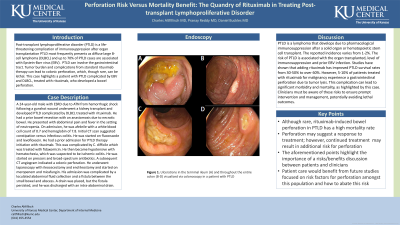Monday Poster Session
Category: Colon
P2027 - Perforation Risk Versus Mortality Benefit: The Quandary of Rituximab in Treating Post-transplant Lymphoproliferative Disorder
Monday, October 28, 2024
10:30 AM - 4:00 PM ET
Location: Exhibit Hall E

Has Audio

Charlie Altfillisch, MD
University of Kansas Medical Center
Kansas City, MO
Presenting Author(s)
Charles Altfillisch, MD1, Pranay Reddy, MD, MPH2, Daniel Buckles, MD2
1University of Kansas Medical Center, Kansas City, MO; 2University of Kansas Medical Center, Kansas City, KS
Introduction: Post-transplant lymphoproliferative disorder (PTLD) is a life-threatening complication of organ transplantation, most frequently presenting as diffuse large B-cell lymphoma (DLBCL). Up to 70% of PTLD cases are associated with Epstein-Barr virus (EBV), occasionally involving the gastrointestinal tract. Tumor burden and complications from standard rituximab therapy can lead to colonic perforation, which, though rare, can be lethal. This case highlights a patient with PTLD complicated by EBV and DLBCL, treated with rituximab, who developed a bowel perforation.
Case Description/Methods: A 24-year-old male with ESRD due to ATN from hemorrhagic shock following a gunshot wound underwent a kidney transplant and developed PTLD complicated by DLBCL treated with rituximab. He had a prior bowel resection with an anastomosis due to necrotic bowel. He presented with abdominal pain and fever in the setting of neutropenia. On admission, he was afebrile with a white count of 0.7 and hemoglobin of 7.8. Initial CT suggested constipation versus infectious colitis. He was started on fluconazole and levofloxacin. He had a prior admission for PTLD therapy initiation with rituximab, complicated by C. difficile, treated with fidaxomicin. Initially stable, he became hypotensive with hematochezia, suspected to be ischemic. He was started on pressors and broad-spectrum antibiotics. A subsequent CTA indicated a colonic perforation, suspected due to PTLD or ischemia. He underwent laparoscopy with ileocecectomy and end ileostomy and started on meropenem and micafungin. His admission was complicated by a loculated abdominal fluid collection and a fistula between the small bowel and abscess. A drain was placed, but the fistula persisted, and he was discharged with an intra-abdominal drain.
Discussion: PTLD is a lymphoma that develops due to pharmacological immunosuppression after a solid organ or hematopoietic stem cell transplant. The reported incidence varies from 1-2% and is associated with the organ transplanted, level of immunosuppression and prior EBV infection. The incidence of PTLD is roughly 1–2%. Studies have shown that adding rituximab has improved PTLD survival rates from 30-50% to over 60%. However, 5-10% of patients treated with rituximab for malignancy experience a gastrointestinal perforation due to tumor lysis, presenting significant risks and complications, as highlighted by this case. Clinicians must be aware of these risks to ensure prompt intervention and management, potentially avoiding lethal outcomes.
Disclosures:
Charles Altfillisch, MD1, Pranay Reddy, MD, MPH2, Daniel Buckles, MD2. P2027 - Perforation Risk Versus Mortality Benefit: The Quandary of Rituximab in Treating Post-transplant Lymphoproliferative Disorder, ACG 2024 Annual Scientific Meeting Abstracts. Philadelphia, PA: American College of Gastroenterology.
1University of Kansas Medical Center, Kansas City, MO; 2University of Kansas Medical Center, Kansas City, KS
Introduction: Post-transplant lymphoproliferative disorder (PTLD) is a life-threatening complication of organ transplantation, most frequently presenting as diffuse large B-cell lymphoma (DLBCL). Up to 70% of PTLD cases are associated with Epstein-Barr virus (EBV), occasionally involving the gastrointestinal tract. Tumor burden and complications from standard rituximab therapy can lead to colonic perforation, which, though rare, can be lethal. This case highlights a patient with PTLD complicated by EBV and DLBCL, treated with rituximab, who developed a bowel perforation.
Case Description/Methods: A 24-year-old male with ESRD due to ATN from hemorrhagic shock following a gunshot wound underwent a kidney transplant and developed PTLD complicated by DLBCL treated with rituximab. He had a prior bowel resection with an anastomosis due to necrotic bowel. He presented with abdominal pain and fever in the setting of neutropenia. On admission, he was afebrile with a white count of 0.7 and hemoglobin of 7.8. Initial CT suggested constipation versus infectious colitis. He was started on fluconazole and levofloxacin. He had a prior admission for PTLD therapy initiation with rituximab, complicated by C. difficile, treated with fidaxomicin. Initially stable, he became hypotensive with hematochezia, suspected to be ischemic. He was started on pressors and broad-spectrum antibiotics. A subsequent CTA indicated a colonic perforation, suspected due to PTLD or ischemia. He underwent laparoscopy with ileocecectomy and end ileostomy and started on meropenem and micafungin. His admission was complicated by a loculated abdominal fluid collection and a fistula between the small bowel and abscess. A drain was placed, but the fistula persisted, and he was discharged with an intra-abdominal drain.
Discussion: PTLD is a lymphoma that develops due to pharmacological immunosuppression after a solid organ or hematopoietic stem cell transplant. The reported incidence varies from 1-2% and is associated with the organ transplanted, level of immunosuppression and prior EBV infection. The incidence of PTLD is roughly 1–2%. Studies have shown that adding rituximab has improved PTLD survival rates from 30-50% to over 60%. However, 5-10% of patients treated with rituximab for malignancy experience a gastrointestinal perforation due to tumor lysis, presenting significant risks and complications, as highlighted by this case. Clinicians must be aware of these risks to ensure prompt intervention and management, potentially avoiding lethal outcomes.
Disclosures:
Charles Altfillisch indicated no relevant financial relationships.
Pranay Reddy indicated no relevant financial relationships.
Daniel Buckles indicated no relevant financial relationships.
Charles Altfillisch, MD1, Pranay Reddy, MD, MPH2, Daniel Buckles, MD2. P2027 - Perforation Risk Versus Mortality Benefit: The Quandary of Rituximab in Treating Post-transplant Lymphoproliferative Disorder, ACG 2024 Annual Scientific Meeting Abstracts. Philadelphia, PA: American College of Gastroenterology.
